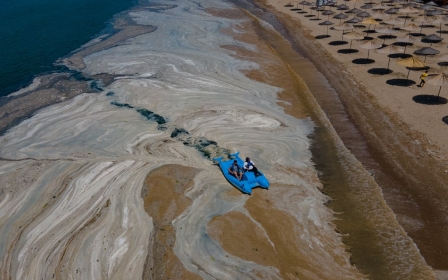At least 40 killed as Turkey struggles to contain flash floods in north
The death toll from Turkey's flash floods rose to more than 40 on Saturday, the latest in a devastating series of natural disasters to hit the country.
36 people died as a result of the floods in the province of Kastamonu, and another seven people died in Sinop, the Disaster and Emergency Management Authority (AFAD) reported.
In one collapsed building along the banks of the swollen river, 10 people were still believed buried. The rapid floodwaters appeared to have swept away the foundations of several other apartment blocks.
The search continued for a missing person in the province of Bartin.
The devastation across Turkey's northern Black Sea region came just as the disaster-hit country was taking control of hundreds of wildfires that killed eight people and destroyed swathes of forest along its scenic southern coast.
Stay informed with MEE's newsletters
Sign up to get the latest alerts, insights and analysis, starting with Turkey Unpacked
Turkey also suffered another bout of flooding in the northeastern province of Rize last month, which killed six.
Erdogan has previously said little about the flooding.
"I offer my condolences to the loved ones of our 17 fellow citizens who lost their lives," he said on Thursday night, when the death toll was still 17.
His office said that Erdogan was speaking on the phone to regional leaders and promising to deliver all the assistance available to the state.
On Friday he visited one of the hardest-hit cities, leading a prayer for the victims and pledging government help.
Global warming devastation
The floods and the fires struck Turkey in the same week that a UN panel said that global warming is dangerously close to spiralling out of control, and that extreme weather would become more severe.
More than 1,800 people were evacuated from affected areas, some with the help of helicopters and boats, AFAD said. Helicopters lowered coast guard personnel onto the roofs of buildings to rescue people who were stranded, as flood water swept through the streets, footage shared by the Interior Ministry showed.
The deluge damaged power infrastructure, and roughly 180 villages were without electricity on Friday evening. Five bridges had collapsed and many others were damaged, leading to road closures, AFAD added. Parts of the roads were also swept away. Television footage showed the floods dragging dozens of cars and heaps of debris along the streets.
Emergency services said waters briefly rose in some parts to as high as four metres, before subsiding and spreading across a region stretching more than 240 kilometres wide.
Agriculture and Forestry Minister Bekir Pakdemirli warned on Wednesday that the area was facing "a disaster that we had not seen in 50 or 100 years”.
Rescuers have been forced to evacuate a hospital holding 45 patients - four of them in intensive care - in the region around the coastal city of Sinop.
Images on television and social media showed stranded villagers being plucked off rooftops by helicopter, and bridges collapsing under the force of the rushing water below.
The Anadolu state news agency said on Thursday that rescuers were focusing on a four-storey apartment building that partially crumbled, and another one next door that had collapsed. Images showed parts of river-front buildings toppling into the flood of brown water below.
Weather services predicted rains would continue to lash the affected area for the rest of the week.
New test for Erdogan
World scientists believe that natural disasters like those in Turkey are becoming more intense and frequent because of global warming and climate change.
They also pose a serious challenge to Erdogan two years before Turkey's next scheduled general election.
The powerful Turkish leader was roundly condemned on social media for tossing out bags of tea to locals while visiting one fire-ravaged region, when the wildfires were first spreading at the end of July.
Polls show that the climate is a top priority for up to seven million members of Generation Z, whose votes Erdogan will need to extend his rule into a third decade in the 2023 election.
Middle East Eye delivers independent and unrivalled coverage and analysis of the Middle East, North Africa and beyond. To learn more about republishing this content and the associated fees, please fill out this form. More about MEE can be found here.





